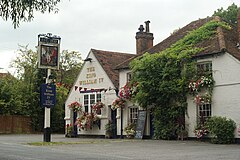West Horsley
| West Horsley | |
|---|---|
 The King William IV is one of two pubs of the village |
|
 Daws Dene refers to part of the Sheepleas and adjoining public woodlands of the North Downs |
|
| West Horsley shown within Surrey | |
| Area | 10.83 km2 (4.18 sq mi) |
| Population | 2,828 (Civil Parish 2011) |
| • Density | 261/km2 (680/sq mi) |
| OS grid reference | TQ0752 |
| Civil parish |
|
| District | |
| Shire county | |
| Region | |
| Country | England |
| Sovereign state | United Kingdom |
| Post town | Leatherhead |
| Postcode district | KT24 |
| Dialling code | 01483 |
| Police | Surrey |
| Fire | Surrey |
| Ambulance | South East Coast |
| EU Parliament | South East England |
| UK Parliament | |
West Horsley is a semi-rural village between Guildford and Leatherhead in Surrey, England. It lies on the A246, and south of the M25 and the A3. The Sheepleas Woods are on the northern downslopes of the ridge of hills known as the North Downs in the extreme south of the village, and stretch to 103 hectares (255 acres) (1.03 km²).
West Horsley appears in Domesday Book of 1086 as Orselei held by Walter, son of Othere. Its Domesday assets were: 8 hides; 1 church, 8 ploughs, woodland worth 20 hogs. It rendered £6 each year to its lords of the manor. Both Horsleys were burnt to the ground during the Norman conquest of 1066 since its Saxon thane, Brixsi, was brother-in-law to King Harold and refused to submit. The village was part of the lands given to the Norman, Walter Fitz Otha, the new constable of Windsor Castle.
The population fell dramatically during the Black Death and the land was given over to grazing, since the peasant population was insufficient for farming.
In 1636, during a court case concerning a tithe dispute, a witness called Henry Mabbinck testified that he played cricket "in the Parke" at West Horsley, one of the sport's earliest references.
Beatrix Potter, best-selling author of children's books, used to stay at a cottage in the village, Tyrrellswood with her uncle and aunt, and did many of her paintings of animals and wrote some of her books there. Helen Allingham painted a country thatched cottage images of England in the village in the same period.
...
Wikipedia

